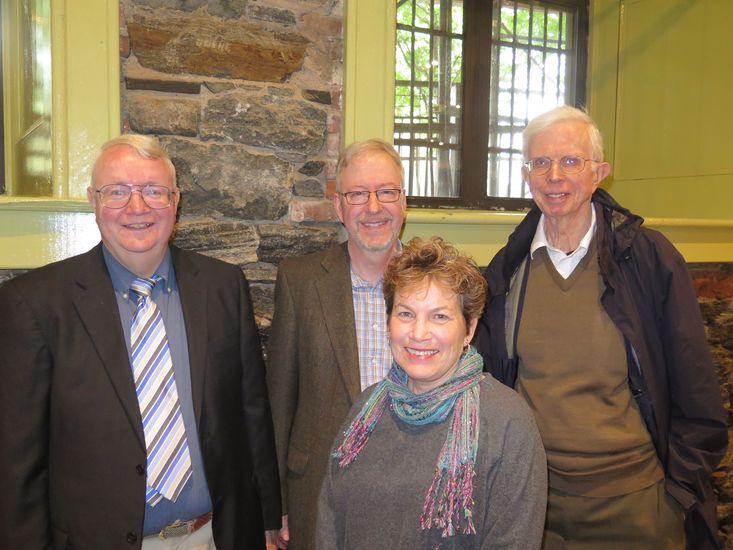By Earle Hitchner
"Do not fear death so much but rather the inadequate life."
That warning comes from Bertolt Brecht's play "The Mother," and the lives of music led by Joe Holmes and Len Graham surely prove they grasped the gist of Brecht's message. Neither has anything to fear from posterity.
Holmes (1906-78) was from Killyramer, Antrim, and Graham (born in 1944) is from Glenarm, Antrim, but now resides in An Mullach Ban, Armagh. My first encounter with these two exceptional singers and close friends was their 1975 Free Reed LP, "Chaste Muses, Bards and Sages." That led me to Graham's solo debut in 1977, "Wind and Water" (Topic), where my admiration for his singing only deepened. And when "After Dawning" (Topic), their second recording together, appeared in 1979 just a year after Holmes's death, I was hopelessly hooked on the rich singing tradition of Ulster that the two embodied.
Four years later, "Ceol Aduaidh" on Gael-Linn by Altan founding members Mairead Ni Mhaonaigh from Gweedore and Frankie Kennedy from Belfast had a similarly profound effect on me regarding Ulster's rich instrumental tradition, and two of the accompanists on that album, Fintan McManus and Ciaran Curran, also recorded with Graham.
The circle somehow seemed complete, and I was the clear beneficiary of these happy accidents.
Graham's interest in the singing, songs, and fiddle tunes of Holmes began from the first time they met in 1963 at an Antrim and Derry fiddlers' gathering in Dunminning near Ballymena. During a night devoted to horsehair bowing, an occasional song was delivered, and 19-year-old Len Graham was asked to sing one. He chose "The Murlough Shore," and one of the fiddlers, 57-year-old Joe Holmes, afterward asked him for the lyrics. They agreed to meet a short time later at Holmes's house in Killyramer, and there Graham discovered that Holmes was a compelling natural vocalist who never sang in public because of early blunt discouragement from a schoolteacher. During that initial visit by Graham, Holmes sang "True Lover John" from memory, and on Graham's second visit, Holmes wrote out the lyrics for him.
This was "the beginning of a musical friendship and partnership that would span a further fifteen years until Joe's sudden death in January 1978," Graham writes in his moving introduction to his new book, "Joe Holmes--Here I Am Amongst You: Songs, Music and Traditions of an Ulsterman," published by Dublin's Four Courts Press. It is easily one of the finest tributes to and chronicles of a fellow Irish traditional musician by another that I have ever read.
This 328-page book comprises detailed, expertly distributed biography, stirring personal recollections, exceptional additional research and musicological scholarship, transcriptions of 80 songs (including a photocopy of Holmes's handwritten lyrics of "True Lover John" from 1963) and 53 dance tunes linked to Holmes, and fascinating photographs.
For proof, see the photo on this page of Graham and Holmes embracing at Feile na Boinne, Drogheda, County Louth, in 1976. It is the same photo gracing the front cover of their album "After Dawning." Another photo in the book shows the late Frank Harte laughing with Holmes and Graham outside Slattery's Pub on Capel Street during the 1975 Dublin Folk Festival, and a 1977 photo features a virtual who's-who of talent, including Holmes, Graham, Harte, Dolores Keane, Phil Callery, Nioclas Toibin, Roisin White, Darach O Cathain, Tim Lyons, and budding poet Ciaran Carson.
A separately sold companion to the book is a 14-track CD, "Here I Am Amongst You: Traditional Irish Songs, Ballads, Lilts & Fiddle Tunes" by Joe Holmes with Len Graham. These "field recordings" often reveal the nonstudio acoustics in which they were originally taped, such as in Joe Holmes's house. At one point Holmes clears his throat during his unaccompanied singing of "The Dark-Eyed Gypsy," a plate clatters to the floor during "Rambling Irishman" sung by Holmes and Graham, and a wall clock chimes out 10 o'clock during Holmes's unaccompanied vocal on "My Charming Blue-Eyed Mary."
But all of those so-called "flaws" reinforce the authenticity and elemental appeal of the singing and fiddling heard on the CD. I wouldn't want it any other way. It's downright refreshing to listen to two singers, one of whom is also a fiddler, and revel in their unvarnished, unhyped music that is far too real for "American Idol" and other spurious "reality" shows. I'm sick of slick, and this album and book provide a welcome, much-needed antidote.
Some of the music on the companion CD has been previously recorded by Holmes and/or Graham. But I can still listen with renewed excitement to such masterfully conveyed songs as "The Rambling Boys of Pleasure," "Tumbling Through the Hay," and "True Lover John," as well as the reel "The Girl That Broke My Heart," a spellbinding example of duet lilting by Holmes and Graham.
In 1993 Len Graham issued the two-part set "It's of My Rambles," containing four cassettes and two 100-page booklets devoted to many of the Ulster musicians whom he met and recorded during what he modestly describes as his "rambles." Not surprisingly, Joe Holmes's fiddling and singing are included.
In fact, most, if not all, of the albums made by Graham since the death of Holmes acknowledge him. If that isn't the definition of real friendship, I don't what is.
Joe Holmes and Len Graham sang together for the last time in Derry's Guild Hall shortly before Holmes's sudden passing on January 5, 1978. Their parting song was "The Parting Glass."
Len Graham's new book is available in hardback or paperback in the United States via ISBS, 920 NE 58th Ave., Suite 300, Portland, OR 97213, 800-944-6190, 503-287-3093, www.isbs.com (look under "Performing Arts & Film"). In Ireland, visit www.fourcourtspress.ie. The CD (CMCD 4454) is on the Cranagh Music imprint and available at www.storyandsong.com.
Taken together, the book and CD get my highest recommendation.
PHOTO: Len Graham (left) and Joe Holmes in 1976 at Feile na Boinne in Drogheda.
House concert
One of Ireland's finest fiddling duos, Galway sisters Yvonne and Liz Kane, will join outstanding Clare concertinist Edel Fox in a house concert sponsored by the Shamrock Traditional Irish Music Society at 8 p.m. on Fri., July 30, in Fairfield, Conn. To get the exact location and reserve seats, contact Tim Quinn at 203-254-1271 or tmquinn@optonline.net.
Golden anniversary
"He gave us two soap dolls, a broken watch and chain, a pair of good-luck pennies, and our lives." The "he" in that quote is Arthur "Boo" Radley, and the narrator is a grown-up Jean Louise "Scout" Finch.
I have cited that sentence many times to college students as an example of complex simplicity, where the lockstep logic of a list can be used to deliver a profound statement. The sentence comes from the last few pages of Harper Lee's "To Kill a Mockingbird," published on July 11, 1960.
Happy 50th anniversary to a beloved novel bearing another powerful message: "Mockingbirds don't do one thing but make music for us to enjoy. They don't eat up people's gardens, don't nest in corncribs, they don't do one thing but sing their hearts out for us. That's why it's a sin to kill a mockingbird."











